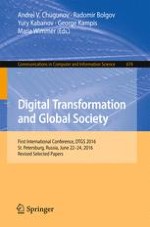This book constitutes the refereed proceedings of the First International Conference on Digital Transformation and Global Society, DTGS 2016, held in St. Petersburg, Russia, in June 2016.
The 43 revised full papers and 15 revised short papers, presented together with 3 poster papers and an invited paper were carefully reviewed and selected from 157 submissions. The papers are organized in topical sections on eSociety: New Social Media Studies; eSociety: eGovernment and eParticipation: Perspectives on ICTs in Public Administration and Democracy; eKnowledge: ICTs in Learning and Education Management; eCity: ICTs for Better Urban (Rural) Planning and Living; eHealth: ICTs in Healthcare; eScience: Big Data Complex Calculations.
